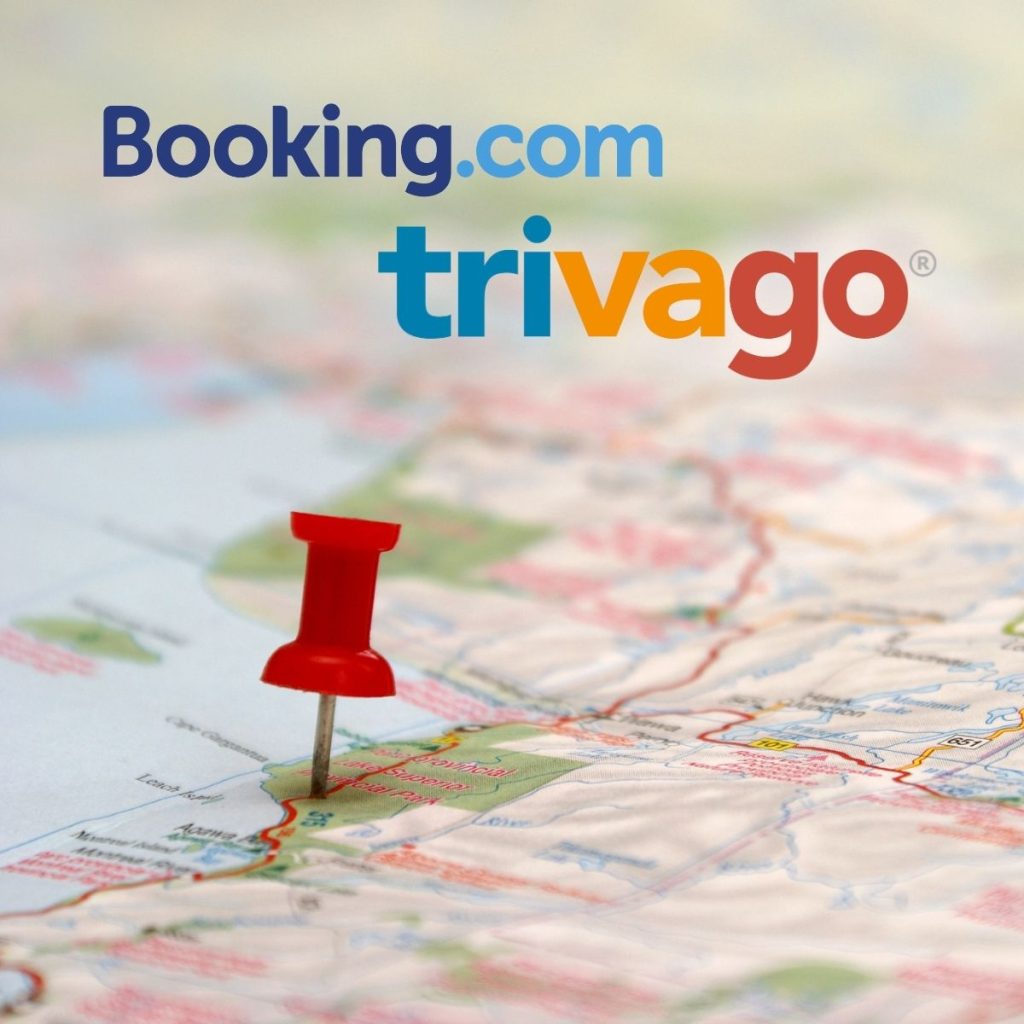Are you torn between Booking.com vs. Trivago for your next hotel booking?
Look no further! In this article, we’ll delve into the key differences and similarities of these popular hotel booking platforms.
We’ll explore their user interfaces, hotel selections, price comparisons, additional features, and user reviews.
By the end, you’ll have a clear understanding of which platform suits your needs best.
So, let’s dive in and make an informed decision for your next travel adventure!

Booking.com vs. Trivago: An Overview
Booking.com and Trivago are both prominent online travel platforms, but they serve different primary purposes.
Booking.com is an online travel agency that offers various accommodation options and travel-related services such as flights and car rentals.
In contrast, Trivago is a hotel metasearch engine specializing in helping users find the best hotel deals by comparing prices from various booking sites.
While Booking.com provides a one-stop shop for booking travel, Trivago simplifies the hotel booking process by facilitating price comparisons.
This makes each platform valuable in its respective domain.
|
|
|
|
- Clean, intuitive interface for easy navigation.
- Diverse accommodation options, including luxury and budget.
- Competitive pricing and deals.
- Secure, straightforward booking process.
- Reviews and ratings for informed decisions.
- Genius loyalty program with exclusive perks.
- Additional fees like resort fees.
- Allows users to compare hotel prices from various booking sites.
- Offers an easy-to-use website and app for searching and booking hotels.
- Provides clear pricing information and details about each hotel.
- Offers robust filtering options to tailor search results to your preferences.
- Has a mobile app for convenient on-the-go bookings.
- It redirects users to third-party booking sites, which can lead to varying policies and customer experiences.
- User reviews and ratings may be inconsistent across different booking platforms.

User Interface and Navigation
When comparing Booking.com and Trivago, you’ll find that Booking.com offers a more user-friendly interface and smoother navigation experience.
Booking.com understands the importance of a seamless user experience, making it easier for travelers to find, compare, and book accommodations.
The website’s clean and intuitive design allows users to effortlessly navigate through the various search filters and options, ensuring that they can quickly find the perfect hotel that meets their specific needs and preferences.
Trivago, on the other hand, may have a more cluttered interface, making it slightly more challenging to navigate and find the desired accommodations.

Hotel Selection and Availability
To find the best hotel for your needs, you can easily search and compare options on Booking.com vs. Trivago.
These platforms offer a wide range of hotels, ensuring that you have plenty of choices to consider.
Here are three key factors to keep in mind when it comes to hotel selection and availability:
- Variety: Both Booking.com and Trivago have a vast database of hotels, ranging from budget accommodations to luxury resorts. This allows you to find a hotel that suits your preferences and budget.
- Availability: These platforms provide real-time availability of hotels, ensuring that you can quickly check if a hotel is available for your desired dates. This saves you the hassle of calling each hotel individually.
- Reviews and Ratings: Both Booking.com and Trivago feature user reviews and ratings for each hotel, giving you insights into the experiences of previous guests. This helps you make an informed decision based on the experiences of others.

Price Comparison and Best Deals
To compare prices and find the best hotel deals, you can easily use both Booking.com vs. Trivago.
These platforms allow users to search for accommodations and compare prices from various booking websites.
Booking.com, known for its vast inventory, provides users with a wide selection of hotels. It also offers exclusive deals and discounts for its users.
On the other hand, Trivago specializes more in price comparison and allows users to compare prices from different booking sites to ensure they’re getting the best deal.

Additional Features and Services
Both Booking.com vs. Trivago offers a range of additional features and services for users to enhance their hotel booking experience.
These additional features and services are designed to provide convenience and added value to users seeking the best hotel deals.
- Filter Options: Both platforms offer a wide range of filter options to help users narrow down their search and find hotels that meet their specific requirements. These filters can include price range, location, amenities, and user ratings.
- Customer Reviews: Both Booking.com and Trivago provide customer reviews and ratings for hotels, giving users valuable insights into the quality and experiences of previous guests. This allows users to make more informed decisions when choosing a hotel.
- Mobile Apps: Both platforms have mobile applications that allow users to search for and book hotels on the go. These apps provide a seamless and convenient user experience, making it easy to find and book hotels anytime, anywhere.
These additional features and services offered by Booking.com and Trivago contribute to a more personalized and user-friendly hotel booking experience, empowering users to make informed decisions and find the best hotel deals.

User Reviews and Ratings
Before making a hotel booking, you need to consider user reviews and ratings.
These reviews provide insights into other travelers’ experiences with a particular hotel, helping you make an informed decision.
Both Booking.com vs. Trivago provide user reviews and ratings for hotels listed on their platforms. However, there are some differences in how the two platforms handle this aspect.
Booking.com allows verified guests to leave reviews, ensuring the authenticity of the feedback.
They also provide a comprehensive rating system, allowing users to rate various aspects of their stay, such as cleanliness, comfort, and location.
On the other hand, Trivago aggregates reviews from different sources, including verified guests, but they need a detailed rating system.
Instead, they provide an overall rating score for each hotel.
Ultimately, the choice between Booking.com and Trivago for user reviews and ratings depends on your preference for a detailed rating system or an overall rating score.

Keep your Travels Worry-free With Travel Insurance
Booking your stay with Booking.com or Trivago is a must, but here’s the real travel secret: You’ve got to lock in some travel insurance to supercharge your adventure!
Check out EKTA Travel Insurance and VisitorsCoverage for top-notch protection.
No time to waste; safeguard your journey today!
 Buy Now
Buy NowSecure your travels with EKTA's comprehensive travel insurance. Travel with peace of mind knowing that you're protected against unexpected events. Don't let uncertainties hold you back - ensure a worry-free journey with EKTA Travel Insurance. Get covered today!
We earn a commission if you make a purchase, at no additional cost to you.
 Buy Now
Buy NowEnsure a worry-free journey to Japan with comprehensive travel insurance from VisitorsCoverage. Stay protected and explore the wonders of Japan with peace of mind. Click here to get covered now!
We earn a commission if you make a purchase, at no additional cost to you.

Final Verdict: How to Decide Between The Two?
Booking.com vs. Trivago are great for booking hotels, but they have different strengths.
Booking.com is like your all-in-one travel companion with an easy-to-use website and many services, while Trivago is your money-smart friend, helping you find the best hotel prices.
Both give you many choices, let you know if rooms are available, and share what other people think about the hotels.
So, when you decide, think about what matters most to you.
Do you want a smooth experience and extra features? Then, Booking.com is a good choice.
If you want to know the best deal and quickly sift through options, go with Trivago.
With this info, you can pick the right site for your next trip with confidence.












Konnichiwa! (Hello!) I'm Pat Tokuyama, a Japanese tofu cookbook author, who travels for music, food, and adventure. If you like Japanese tea, checkout some of the newestorganic japanese tea, matcha bowls and noren and more!
** Curious about the Plant Based Japanese Cooking Club? ** Learn more here!